- Learning time
- 30 minutes
- First play time
- 80 minutes
The Search for Planet X
Designed by: Ben Rosset,Matthew O'Malley
Where, exactly, is the mysterious and elusive Planet X? That’s for you to figure out in this game of astronomical deduction. In The Search for Planet X the goal is to find the planet – but you can win the game even if someone else finds it before you…
The board shows the sky broken into 12 (standard) or 18 (expert) sectors. There’ll always be the same number of asteroids, gas clouds, comets and dwarf planets in every game (along with three seemingly-empty sectors) and certain rules are universal too: asteroids always come in pairs (or a set of four) , gas clouds are next to empty sectors and so on. Everyone has a sheet to keep track of their information and these basic rules are handily listed there.
Beyond that, each play of The Search for Planet X is distinct, and to make it so at least one player will need to download the app onto their tablet or phone. How it works is like this: on your turn, you take one of three actions: Survey, Research, or Target. Surveying is selecting a number of sectors and asking the app how many, if at all, there are of a certain celestial body there are. You might for instance ask is there a dwarf planet in sectors 9-11, and the app will tell you. Researching is asking about the relationship between specific bodies: researching might lead you to discover that, in this game, Planet X is not next to a comet. And targeting gives you all the information about a specific sector of your choosing (caveat: the sector with Planet X in always appears empty). Targeting is very helpful in gaining definitive information, but you can only do it twice per game.
As players take actions, they spend ‘time’ and move around the edge of the board, and the visible sky – the area you’re allowed to take actions on – moves with them. Whoever is furthest back on the time track is the active player, so occasionally this can mean you’ll get two consecutive turns! At certain points you’re invited to submit theories about your learning (or calculated guesses. Or even wild guesses!): these aren’t immediately revealed, but will become so later in the game – correct theories are worth points; incorrect ones cost you on the time track.
It’s worth noting that correct theories are revealing information to other players, as does the once-per-game (twice in expert mode) conference, where the app is used to give everyone some breakthrough information about where Planet X is. As soon as you’re confident enough, you can make a guess as to where Planet X is. It’s costly enough not to do so wildly (5 time!) but getting it right triggers the end of the game: everyone else gets one more turn (they can still guess too, if they like) and everyone scores points both for locating Planet X – if they did; those who did it sooner score more points than those who did so later – and all correct theories on the board, with bonus points for being the first to submit a correct theory.
The guru's verdict

-
Take That!
Take That!
None to speak of, although you may be desperately waiting for your turn so you can locate the titular planet, only to watch someone do it before you...
-
Fidget Factor!
Fidget Factor!
Moderate. There's a lot of thinking to be done, but much of it can be done either on other player's turns, or all at the same time.
-
Brain Burn!
Brain Burn!
Rules aren't heavy at all, but to enjoy The Search for Planet X, you need to be onboard with the fact it's a cognitive challenge, the expert side especially so.
-
Again Again!
Again Again!
The story, tone, and flavour of Planet X don't vary, but the app ensures the puzzle - and solution - is different every time. If you like deduction games it's not one you're going to tire of very quickly!

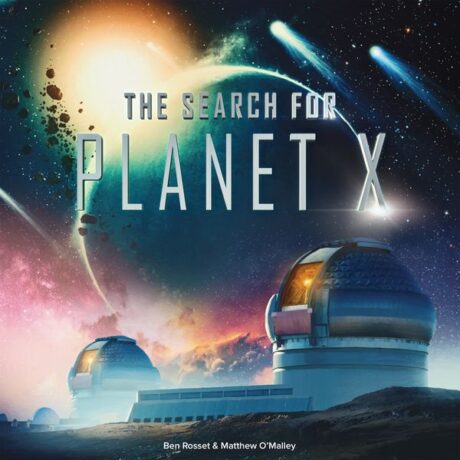

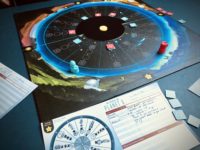
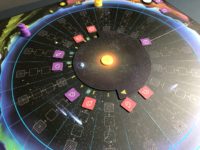
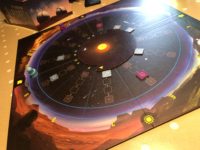


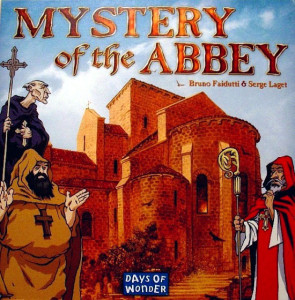


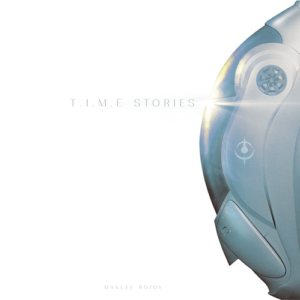
Sam says
I'm a bit of a sucker for deduction games but I've never found my holy grail - until now. My slightly luddite anti-screen tendencies have been overcome, because the app here streamlines what would otherwise be a complicated undertaking, and the game itself feels thematic. Whilst your opponents are peering through their telescopes at one part of the sky, you're squinting at another, and it's a race to be first to figure out the mystery. Unlike some deduction games that throw out red herrings, everything here is absolutely logical, and that means every turn you take has a sense of progression, even though you might go through the information-overload stage before you come out the other side! Suddenly something you learn clicks a whole bunch of sectors into place: if the comets are definitely there, that means the asteroids must be there, and that means... it's a cascade of eureka-moments as you narrow down the options, and at the same time a heightening of tension as you realise everyone else is doing the same thing. Maybe you shouldn't have told everyone about that dwarf planet after all...